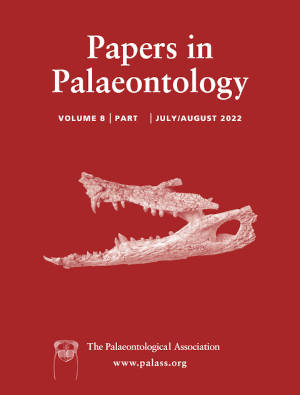Article: Bone-bearing coprolites from the Upper Triassic of India: ichnotaxonomy, probable producers and predator–prey relationships
Publication: Papers in Palaeontology
Volume:
8
Part:
1
Publication Date:
2022
Article number:
e1418
Author(s):
Nibedita Rakshit, and Sanghamitra Ray
DOI:
10.1002/spp2.1418
Abstract
Abstract Multiple spiral and non-spiral cylindrical coprolites with profuse bone inclusions were recovered from a metoposaurid-dominated bonebed in the Upper Triassic Tiki Formation of India. The spiral coprolites are assigned to two new ichnotaxa based on amphipolar and heteropolar micropolar coilings. The non-spiral coprolites are internally devoid of any spiral structure, mostly cylindrical, except for a few, which are ellipsoidal. All of these coprolites contain randomly scattered inclusions of partly digested and undigested skeletal fragments. Based on external and internal morphology, and the type of inclusions, the probable producers of these coprolites are considered to have been carnivorous and/or piscivorous, and included different types of chondrichthyans, dipnoans and actinopterygians, as well as various semiaquatic and terrestrial tetrapods. A web-like interconnectedness is evident, which highlights dynamic and highly diverse animal communities inhabiting the terrestrial, semiaquatic and aquatic realms and dissolution of the inter-realm boundaries in the Upper Triassic Tiki palaeoecosystem.
